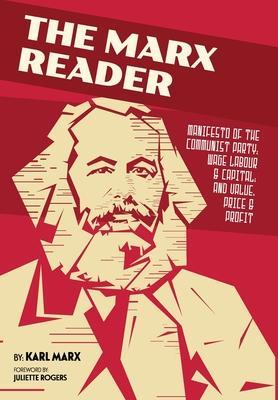The Marx Reader: Manifesto of the Communist Party; Wage Labour & Capital; and Value, Price & Profit

The Marx Reader: Manifesto of the Communist Party; Wage Labour & Capital; and Value, Price & Profit
Whenever a collection of Marx's works is published, a few questions inevitably arise. Is Marx still relevant today? Do we still have something to gain from reading the great man's thoughts about economic structures? To put this question another way - if Marx was wrong, in the end, about what communism would look like, then why do we still read his writings?
One way to answer this is by looking at the similarities between Marx's world and ours. The "Communist Manifesto" describes a world which is dominated by materialism. People are leaving their farms and flocking to the cities. Technology is steadily taking over the workforce. Cheap goods are flooding the market in Europe and beyond.
"Wage Labor and Capital" describes, in familiar detail, the impact of technology on social relations. Both "Wage Labor" and "Value, Price and Profit" describe a world in which capital needs to constantly expand in order to stay competitive. Wages are kept as low as possible. Skilled workers are losing their jobs to machinery and have to compete for unskilled work which pays far less. Workers live in squalid conditions and work long hours.
The world which Marx describes, in other words, has a good deal in common with the world we know today. Marx's writing shines in its ability to describe that world clearly and without sentimentality. The ideas that he develops in "Capital," his masterwork on economic theory, apply today more than ever. That's because his theories are based in steady observation of material reality. Marx's genius was in his ability to observe the material world and extrapolate the laws that underpinned that material reality.
PRP: 165.25 Lei
Acesta este Prețul Recomandat de Producător. Prețul de vânzare al produsului este afișat mai jos.
148.72Lei
148.72Lei
165.25 LeiLivrare in 2-4 saptamani
Descrierea produsului
Whenever a collection of Marx's works is published, a few questions inevitably arise. Is Marx still relevant today? Do we still have something to gain from reading the great man's thoughts about economic structures? To put this question another way - if Marx was wrong, in the end, about what communism would look like, then why do we still read his writings?
One way to answer this is by looking at the similarities between Marx's world and ours. The "Communist Manifesto" describes a world which is dominated by materialism. People are leaving their farms and flocking to the cities. Technology is steadily taking over the workforce. Cheap goods are flooding the market in Europe and beyond.
"Wage Labor and Capital" describes, in familiar detail, the impact of technology on social relations. Both "Wage Labor" and "Value, Price and Profit" describe a world in which capital needs to constantly expand in order to stay competitive. Wages are kept as low as possible. Skilled workers are losing their jobs to machinery and have to compete for unskilled work which pays far less. Workers live in squalid conditions and work long hours.
The world which Marx describes, in other words, has a good deal in common with the world we know today. Marx's writing shines in its ability to describe that world clearly and without sentimentality. The ideas that he develops in "Capital," his masterwork on economic theory, apply today more than ever. That's because his theories are based in steady observation of material reality. Marx's genius was in his ability to observe the material world and extrapolate the laws that underpinned that material reality.
Detaliile produsului











